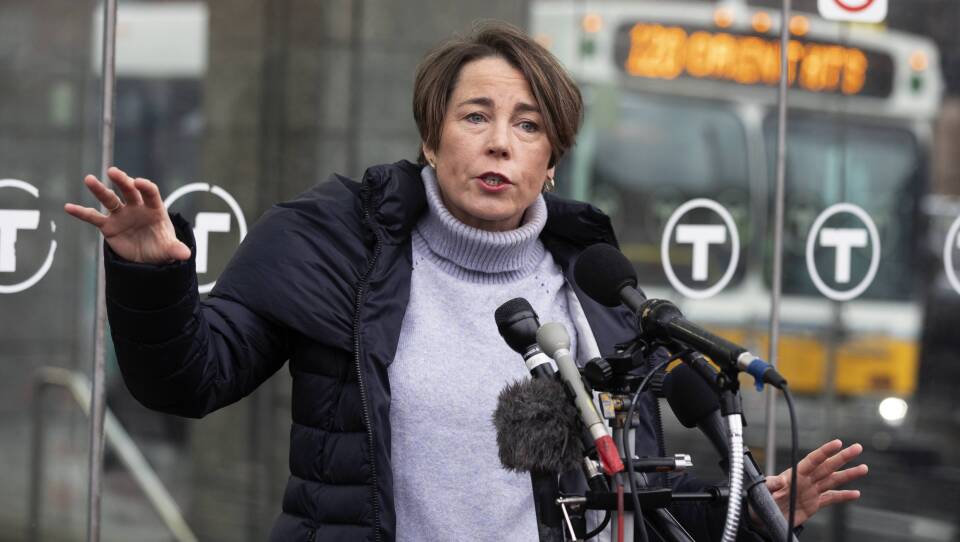After eight years of Charlie Baker, the MBTA will be getting a new overseer: Governor-elect Maura Healey. Baker’s tenure was a tumultuous one for the T, starting with the arduous snowy winter of 2015 and ending with a year in which a man was killed on the Red Line, the Federal Transit Administration issued a scathing report about a lack of safety, and the entire Orange Line was shut down for a month. GBH’s transportation reporter Bob Seay joined Morning Edition co-hosts Paris Alston and Jeremy Siegel to talk about what a Healey administration could mean for the T. This transcript has been lightly edited.
Jeremy Siegel: Bob, it is no secret that the T is in a tough spot right now: Financially, image-wise, service-wise, safety-wise, and depending on which train you're getting on, cleanliness-wise. What can Governor-elect Maura Healey do to fix it?
Bob Seay: Well, she has the opportunity right now, you might say. Of course, Governor Baker, after eight years, tried his best, but some might say we're sort of back to where we were in 2015 in terms of service and reliability. He could testify to the fact that it's not easy, something I'm sure that Governor-elect Healey is well-aware of. But she's got some big decisions to make and she's got to make them pretty soon, because general manager Steve Poftak, of course, has announced he's leaving Jan. 3 , which is two days before Maura Healey officially becomes governor. And some wondered why he wouldn't stay on to provide a more seamless transition.
But in any case, he's sort of forcing her hand to decide immediately what kind of leadership she wants. Now she may not choose a new general manager right away, it might take some time. There might be somebody appointed in the interim. But she's being encouraged to do a really thorough search for the best person she can find to do the job.
Paris Alston: Bob, in addition to finding a new leader for the T, what are going to be the other big issues that the governor-elect is going to face up front?
Seay: She also will be appointing a new secretary of transportation to her cabinet, most likely, and there will be some governance changes within the T. She suggested appointing another deputy general manager to focus on capital projects, one focusing on operations. And she also has a board of directors which she will be appointing. And some are calling for that board to be more proactive and have more authority in actually running the MBTA. So those will be some of the things that she will face in terms of governance. And I would suggest that maybe she might not want to replace too many people at the T, because there is a lot of institutional knowledge there that will be very useful going forward, because the T is involved in many multibillion dollar projects that you don't want to pull the rug out from under the people who are doing the job right now. So there's going to have to be some continuity. And the balance is going to be the challenge for her.
"Some are calling for that board to be more proactive and have more authority in actually running the MBTA."-GBH Transportation reporter Bob Seay
Siegel: You mentioned how aware outgoing Governor Charlie Baker is of how difficult it is to be the person who's in charge of the people who are in charge of the T. Governor Charlie Baker is different than Maura Healey. Obviously, he's a Republican. She's a Democrat. But politically, she was kind of the inheritor of his administration headed into this election. How much different can and will she do when you compare her administration to the past eight years of Governor Charlie Baker and the T?
Seay: Well, that's a good point, Jeremy, because a lot of things with the T are built in. There are challenges that are built in: The aging infrastructure, the frustration about not being able to get those new Red Line cars on schedule. There are lots of real-life challenges that Maura Healey is going to face, that she's not going to be able to do a lot about. But one of the long-range things, which is really important, is funding. And transit advocates for a long time have said that what the T needs is a sustainable, long-range funding plan. And that's yet to emerge from the legislature. And that'll be one of her biggest challenges, is to get the funding so that they don't have to rely so much on fares, they don't have to rely on federal funding, which won't be that available in a year or so.
This is going to be a really hot political potato in terms of, how do you raise the money we need to fix the T, which is going to take billions of dollars. And like a friend of mine said, this is not a sprint. This is a marathon. This is something that she's not going to be able to accomplish very quickly. So you want to keep the expectations a little low here because it's going to be a tough slog.











